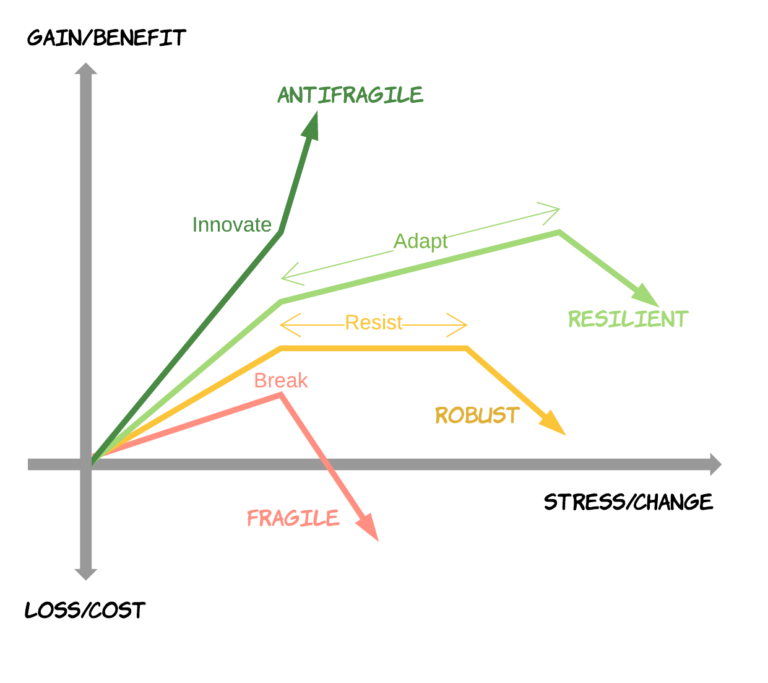The coronavirus situation is dominating the media space today. The amount of information that we are bombarded with is tremendous. And it generates a lot of reaction everywhere – some reasonable and sensible, and some not that much. Business-wise, the only reasonable thing a company could (and should!) do is to take a deep look into its business continuity setup and analyse it from the fragility standpoint.
Does this coronavirus situation make you fragile in any aspect of your operation? And, if it does, how do you remove the fragility?
Or, better yet – how do you become antifragile (to borrow from Mr. Taleb, yet again ☺).
According to Taleb, the opposite of fragile is antifragile. Antifragility is beyond resilience or robustness. The resilient resists shocks and stays the same; the antifragile gets better. [..] More technically, Taleb defines antifragility as a nonlinear response: “Simply, antifragility is defined as a convex response to a stressor or source of harm, leading to a positive sensitivity to increase in volatility (or variability, stress,…)
(borrowed from: https://en.wikipedia.org/wiki/Antifragile)

Source: https://developers.redhat.com/blog/2016/07/20/from-fragile-to-antifragile-software/
The opposite of fragile is antifragile
In other words, being truly antifragile means being able to innovate and reinvent (the affected parts of) yourself when you’re hit by a stressor. And we are talking about organizations here.
During the last great crisis (remember 2007?) CROZ built a service offering model which responded very well to the changed market situation of the time. The model was built around our ability to support enterprise clients in all aspects of their business continuity. The services we offered to the market were not new. Those were the things we already used to do for some years, but in a different packaging. When the market was hit by a crisis (a stressor!), we responded by changing the packaging and adjusting the delivery models. And it worked very well. It still does, btw – it’s our Managed Services Offering. Our response was antifragile.
Now, looking at the impact of coronavirus story to the markets where we operate, it’s hard not to see how different (enterprise) organizations react to it. I would say most of the responses are fragile (things break) or robust (things fight to stay the same). Some are resilient (things adapt for some time, and then revert to previous state). And this is to be expected, I guess.
Body leasing is fragile!
One of the points of fragility for many enterprises in coronavirus crisis (or, the points in which things start to break) is business continuity. How do you preserve your business continuity when there’s suddenly no travel? And when parts of your teams (subcontractors, vendors, partners,…) supporting business critical systems are unavailable, or not able to deliver their services in an off-site manner? Or maybe your governance models do not allow for remote delivery of services?
These are the kinds of breakages that we see in some enterprises today. All of a sudden, organizations discover that business continuity is not only related to DR locations and backup/recovery policies… Maybe it’s finally the right time to acknowledge those dreadful body-leasing types of engagements many enterprise organizations like to use are in fact making them fragile?
In our line of work, being able to support the business continuity of enterprise clients as an external partner is not a simple thing. It means being very experienced in understanding how enterprise systems are built and run. It means being very fast and flexible in setting up dedicated cross-functional remote teams capable of understanding your environment, integrations, back-end systems, processes etc. It also means being able to perform a very quick and thorough onboarding. Finally, it also means being able to offer a client a set of stable and proven communication and management approaches that fit in smoothly into their existing governance models.
We at CROZ have spent a lot of time, from 2007 until nowadays, building experience and continuously improving the model of supporting enterprise clients in this way. It’s proven and well-functioning. And we feel we are ready to help more organizations to remove the points of fragility in their business continuity.
Also, in the broader context – the model allows for a safe delivery of services, protecting both client’s and our teams, and also contributing to containing the virus spread by reducing travel.
So, contact us and let’s see what your fragile points are and how our teams can leverage our experience and expertise to take burden off your back and help you preserve business continuity in these challenging times.
Remember, antifragility is the ability to innovate and reinvent when hit by a stressor! Therefore, it’s not only about setting up a temporary VPN connection… That would be a resilient response, which would soon make you fragile again ☺
Photo by Dorothe Wouters on Unsplash
Falls Sie Fragen haben, sind wir nur einen Klick entfernt.


